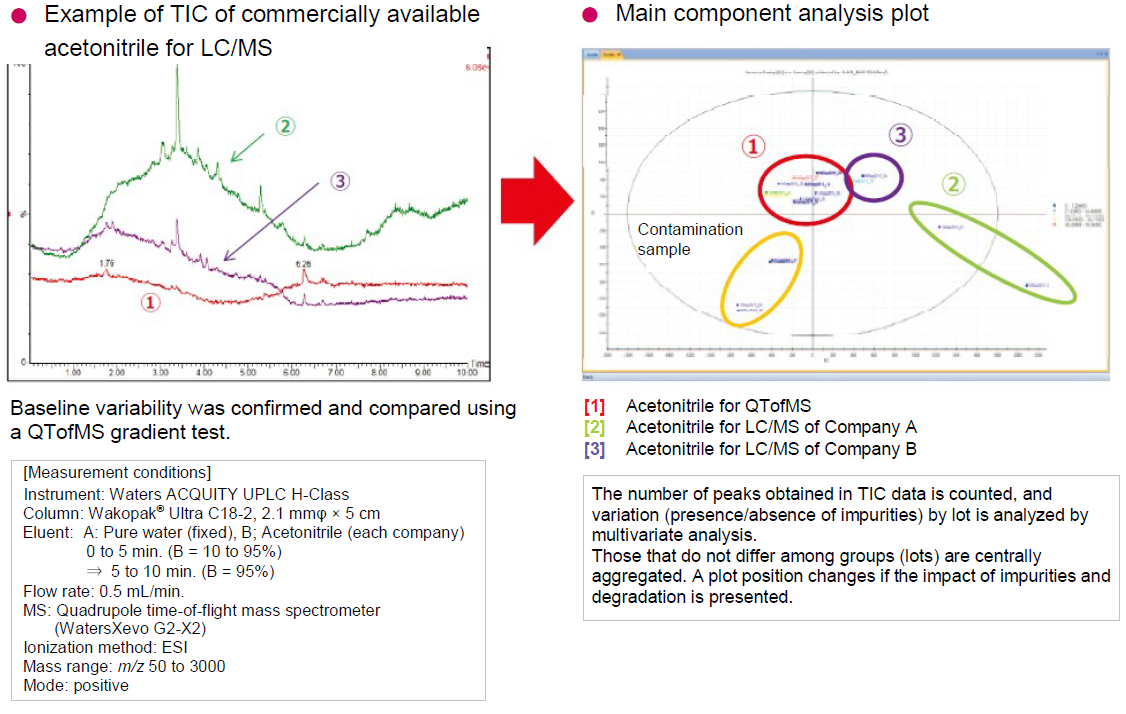[Chromatography Q & A]: Differences among solvents for QTofMS, HPLC, and LC/MS
HPLC has been used in a wide range of fields as an analytical procedure that can be applied to analysis of a wide range of samples. Solvents used in HPLC are selected based on conditions, such as dissolving sample compounds but not reacting with the sample compounds, light load on columns, and no interference with detection. In HPLC, because UV-vis detectors and fluorescence detectors are used, detection absorbance and fluorescence are kept low to do not interfere. LC/MS requires that a mass spectrometer does not cause clogging and has low background noise.
Table 1 shows specification requirements and values for acetonitrile of FUJIFILM Wako, which is a Guaranteed Reagent, for HPLC, for LC/MS, and for QTofMS.
Table 1. Specification requirements and values of acetonitrile
| Guaranteed Reagent | for HPLC | for LC/MS | for QTofMS | ||
|---|---|---|---|---|---|
| Assay | [%] | min. 99.5 | min. 99.8 | min. 99.8 | min. 99.8 |
| Density (20℃) | [g/mL] | 0.780 - 0.784 | 0.780 - 0.783 | 0.780 - 0.783 | 0.780 - 0.783 |
| Refractive index n20D | 1.343 - 1.346 | 1.343 - 1.346 | 1.343 - 1.346 | 1.343 - 1.346 | |
| Water | [%] | max. 0.1 | max. 0.05 | max. 0.05 | max. 0.05 |
| Residue after evaporation | [%] | max. 0.005 | max. 0.001 | max. 0.001 | max. 0.001 |
| Acidity (as CH3COOH) | [%] | max. 0.01 | max. 0.001 | max. 0.001 | max. 0.001 |
| Ammonium (NH4) | [ppm] | - | max. 0.3 | max. 0.3 | max. 0.3 |
| Peroxides (as H2O2) | [ppm] | - | max. 5 | max. 5 | max. 5 |
| Hydrogen cyanide | to pass test | - | - | - | |
| Substances reducing permanganate (as O) | [%] | to pass test | to pass test | to pass test | to pass test |
| Gradient test | - | to pass test | to pass test | to pass test | |
| Particles (0.5μm or more) | [pcs/mL] | - | - | max. 100 | max. 100 |
| Absorbance | 200 nm | - | max. 0.05 | max. 0.05 | max. 0.05 |
| 210 nm | - | max. 0.03 | max. 0.03 | max. 0.03 | |
| 220 nm | - | max. 0.02 | max. 0.02 | max. 0.02 | |
| 230 nm | - | max. 0.01 | max. 0.01 | max. 0.01 | |
| 240 nm | - | max. 0.005 | max. 0.005 | max. 0.005 | |
| Fluorescence test | - | to pass test | to pass test | to pass test | |
| Suitability for LC/MS analysis | - | - | to pass test | - | |
| Suitability for QTofMS analysis | - | - | - | to pass test | |
Because the quality of Guaranteed Reagent has been assured by testing according to methods specified in JIS, no absorbance measurement for ultraviolet rays or fluorescence test, which has not been specified in JIS, has been performed. For HPLC grade, the absorbance of ultraviolet rays is measured, and a gradient test and fluorescence test are performed to ensure low background noise. In addition, attention has been paid to ensure the content of peroxide and to prevent samples from decomposing during analysis. In addition to specifications for HPLC, the LC/MS grade is tested suitability for LC/MS analysis to ensure low background noise in LC/MS analysis. Microparticles are also checked by particle measurement.
Recently, MS with higher sensitivity and higher resolution has been widely used for researches, such as metabolomics and proteomics. Highly sensitive and high-resolution LC/MS requires a solvent with less impurities.
QTofMS (quadrupole time-of-flight mass spectrometer) is a highly sensitive and high-resolution LC/MS characterized by its ability to comprehensively measure ions in full scan mode. A solvent for QTofMS leverages this feature by performing gradient elution in QTofMS with a column connected to check impurities in a wide mass range (m/z 50 to 3000) with full scan (Suitability test for QTofMS analysis). In addition, obtained data are analyzed using a multivariate analysis software. In other words, comprehensive ingredient data are used to quickly determine similarities and differences among samples and statistically process effects of impurities and time-dependent changes for more reliable assurance. Figure 1 shows an example of TIC (total ion chromatogram) and example of main component analysis of commercially available acetonitrile for LC/MS.

Figure 1. Example of multivariate analysis of commercially available acetonitrile
As shown above, there are differences in specification requirements (contents of quality assurance) implemented for products of each grade.
For HPLC: General reagent test + Absorbance measurement + Fluorescence test + Gradient test
For LC/MS: Test for HPLC + Particle measurement + Suitability test for LC/MS analysis
For QTofMS: Test for HPLC + Particle measurement + Suitability test for QTofMS analysis
FUJIFILM Wako recommends using a solvent for QTofMS for sensitive and high-resolution LC/MS. For other LC/MS, use a solvent for LC/MS, and for general HPLC, use a solvent for HPLC.




